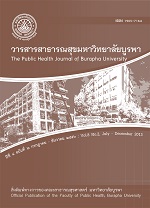Effect of Perceived Self-efficacy and Social Support on Behavior Modification of Asthma Patients
Main Article Content
บทคัดย่อ
This study was a quasi-experimental research aimed to evaluate the result of behavioral modification programs to prevent asthma. The program was constructed by applying perceived self – efficacy theory and social support as activity guidelines. The target population was the asthma patients aged 16-60 years old at 50th Anniversary Mahavajiralongkorn hospital. The experimental group was 33 asthma patients who undertook a 12-weeks experimentation. Data were collected by interview questionnaire. Statistical analyses included percentages, means, standard deviations, minimums, maximums and Paired-samples t-test.
Results of the study showed that applied Perceived self-efficacy Theory and Social support was effective in helping asthma patients to gain higher mean scores of perceived self-efficacy, self-expected outcome, obtaining social support, and behavioral modification at a statistically significant level of 0.05. The application of Perceived self-efficacy Theory and Social support could improve preventive behavior among these asthma patients in that they could prevent the episode of asthma attack. This program can be used in asthma patients at other similar hospitals.

